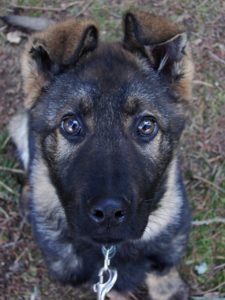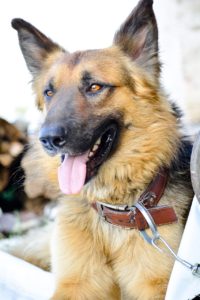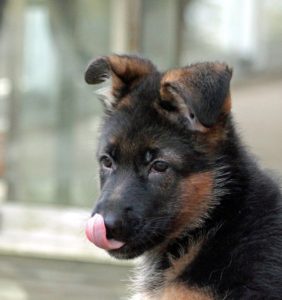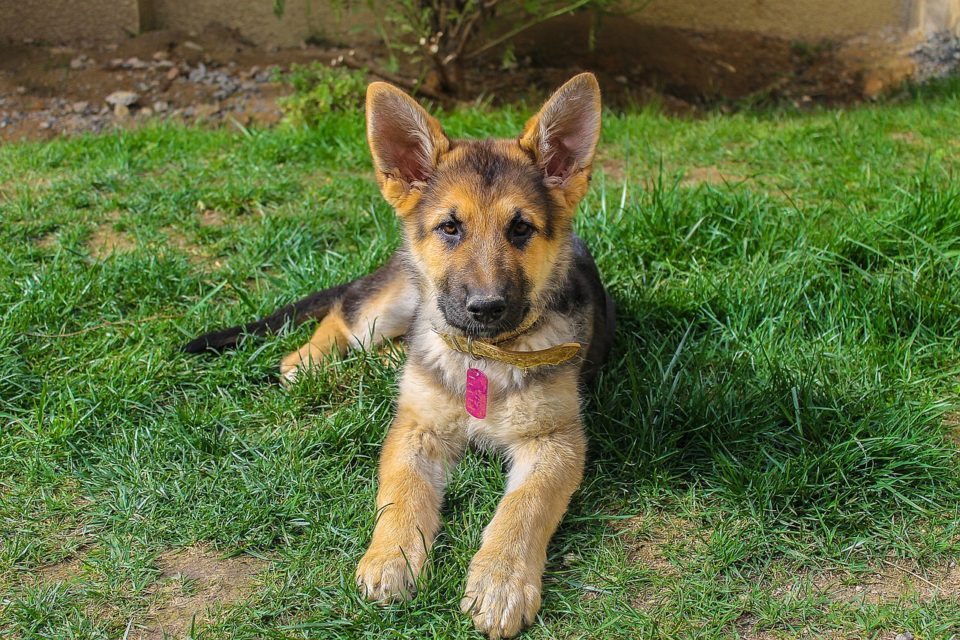Being an ultimate dog-lover, I’ve come across my fair share of dog breeds over the decades.
I have my favorites, and some…. I probably wouldn’t end up adopting because I don’t feel that they would be right for me and my household.
Of course, before taking one home, it’s always best to do your research as you may want to take certain things into consideration.
Such as, personality types, diet, energy levels(!!!) and naturally, you might want to get some idea of how big they will end up growing if you take one in as a pup.
Just so there are no crazy surprises, later down the line!
Let’s take 2 common dog breeds that are fairly popular in the UK and have a look at their similarities and differences.
This can help you in making a suitable decision for you and the family.
German Shepherd vs Bulldog Size: Which is Bigger?
Both dogs are medium to large, but not surprisingly, German Shepherds top that by weighing an average of up to 43kg and can reach up to 64cm in height.
Bulldogs on the other hand can weigh up to 25kg and can reach 40cm.
German Shepherds would be better suited if you are looking for a big dog.
Though do make sure you have enough storage space for him in terms of kennels and cages for transporting.
German Shepherd vs Bulldog Temperament: How Do They Behave?
 Having bundles of energy, you may find it interesting to know that German Shepherds make highly favorable guide dogs.
Having bundles of energy, you may find it interesting to know that German Shepherds make highly favorable guide dogs.
Not only do they have bundles of energy and are extremely tolerant with kids, but they’re incredibly obedient.
They also have excellent guarding potential since they’re smart and therefore easy to train.
The bulldog is also quite friendly with far less energy but equally wonderful with kids.
People-orientated, dependable and predictable, these little guys make the ideal hairy babysitter!
They get along well with other family pets too, so you won’t feel insecure about leaving your Bulldog alone with Larry the Goldfish!
And you might be relieved to know that both have a low tendency to bark.
German Shepherd vs Bulldog Life Span: What’s Their Life Expectancy?
Bulldogs can usually make it to 7 or 8 years.
This isn’t too bad if you get him as a pup for older children, but the younger ones may not cope as well as the rest of the family when this one passes!
A healthy German Shepherd can live a good 11-12 years if loved and looked after well. A great companion to grow up with.
German Shepherd vs Bulldog Overall Health: Are They Prone to Health Conditions?
It may come as no surprise, given their general appearance, but Bulldogs are prone to obesity if they’re being overfed or fed with the wrong foods.
They’re low-endurance which means that they only need a moderate amount of exercise, but some can end up with very little, at all.
Bulldogs cope with medium temperatures better. In hot summers, they can overheat easily, and in the cold winters, they can catch chills.
You will need to regularly wipe the wrinkles on their face to prevent skin infections.
In general, German Shepherds can live a long and healthy life if looked after properly, however, they are prone to hereditary conditions such as hip dysplasia and epilepsy
Both of which can be controlled through regular visits to the vets and with the right medication.
Always check with a reputable dog breeder if you wish to avoid this.
German Shepherd vs Bulldog Appearance: What Do They Look Like?
 Of course, it’d be pretty difficult to mistake these 2, since their physical differences are vast:
Of course, it’d be pretty difficult to mistake these 2, since their physical differences are vast:
German Shepherds have medium, almond-shaped eyes with erect ears, a saber tail and no wrinkles or folds.
Alternatively, Bulldogs have medium and rounded eyes, rose ears, a screw tail and lots of wrinkles and folds!
Certainly not as furry as a stuffed toy, but they more than make up for that in their levels of cuteness!
German Shepherd vs Bulldog Shedding: What Kind of Coats Do They Have?
For some dog owners, this section can really make or break their decision in choosing a breed.
With their short coats and short hair length and density, Bulldogs don’t shed very often and won’t need a great deal of grooming.
This may well be ideal for any asthma and allergy-sufferers, especially since these types will love being around children.
German Shepherds, however, have a great deal of long hair density, as well as an undercoat, which means that they shed heavily about twice a year.
For the rest of the year, they will continue to shed, but not as much.
These coats will need to be brushed a few times a day, at least.
You might prefer to do this outside to avoid having to get the hoover out on a daily basis!
German Shepherd vs Bulldog Training: Can They be Trained Easily?
 When it comes to training, the German Shepherd will be a breeze.
When it comes to training, the German Shepherd will be a breeze.
Fiercely obedient and originally from Germany, this breed was the military breed of choice and was introduced in the US by World War 1 soldiers returning home from the War.
They were the first guide dogs and are renowned for being both loyal and courageous with natural guarding instincts.
This make them excellent Police dogs, Military dogs, as well as Search and Rescue dogs. Their high levels of intelligence and energy make these Shepherds a joy to train.
If you would like help training your German Shepherd puppy check out this article!
Believe it or not, Bulldogs also posses an obedient nature with good trainability qualities and guarding potential.
Although generally laid back, they were once bred for bull baiting, and this level of courage and stamina make them excellent watchdogs.
German Shepherd vs Bulldog Diet: What Do They Eat?
As a muscular, high-energy dog, the German Shepherd will need a high-quality, hearty diet including 1,740 – 2,100 calories a day.
Their main foods should consist of a good source of proteins, carbohydrates, fats and vegetables.
Foods that contain fish oils such as Omega-3 fatty acids will keep your Shepherd’s coat shiny and healthy.
Plenty of fats and carbohydrates are essential.
Since skin problems can occur with wrinkly Bulldogs, so a diet rich in vitamins and Omega-3 fatty acids are important.
This can help reduce any inflammation.
Due to their active lifestyle, Bulldogs will usually take in 1,358 calories on a daily basis and so proteins and balanced fibres are especially important for this.
Chicken eggs, dairy and some proteins can trigger allergic reactions in this breed, so do check this over with your vet.
German Shepherd vs Bulldog Environment: Where Are They Best Suited?
 If you prefer active dogs, such as a dog to go for long walks or jogging with, then a Bulldog is probably not for you.
If you prefer active dogs, such as a dog to go for long walks or jogging with, then a Bulldog is probably not for you.
Typically, Bulldogs are indoor dogs. Part of the furniture.
Be wary of leaving them outside for too long because, due to the structure of the nose and face, some Bulldogs suffer breathing problems.
This means that allergens like pollen, and hot or cold temperatures, can cause them to suffer even more.
If you live in a hot climate, be sure to keep your Bulldog well air conditioned.
If you live in a cold climate, ensure your home is warm and free from draughts.
German Shepherds thrive on training and socializing and will need an owner whom is fully committed to the task.
They are happy in family homes so will get along well with children and with other dogs, usually.
They do need plenty of room to roam and run around in, as exercise is important for these high-energy dogs.
German Shepherd vs Bulldog Running Costs: Are They Expensive to Look After?
Bulldogs don’t need too many baths, but they do drool – a LOT! (You have been warned.)
Regular brushing is important – a few times a week – as with most short haired dogs, and special attention needs to be taken on his wrinkles to avoid infections.
Their flat muzzle and undershot jaw can mean occasional trips to the dentist.
Skin conditions, eye infections and obesity are also common issues that Bulldogs are prone to, which can of course, cause frequent trips to the vet.
Breathing and dental issues can be prevented by giving your pup dry food (always speak to your vet, first) which will make chewing and swallowing easier.
A 30lb bag of quality dry food will cost around $60. For best affordable dog food check out this article!
As with Bulldogs, German Shepherds won’t need regular bathing, but their long hair and consistent shedding will require frequent brushing – a few times a day.
Regular exercise and visits to the vet are also a must.
Of course, as with any lifetime pet, you’ll need to look at costs of covering neutering, vaccinations, food, pet insurance, toys, grooming, worming, flea treatments and accessories.
On average, the annual cost of owning either a Bulldog or a German Shepherd is between $1,200 – $1,500.
Final Thoughts
 So, the questions you need to ask yourself are:
So, the questions you need to ask yourself are:
Is a German Shepherd right for me?
A true, dog-lover’s dog. Smart, loyal, courageous. He’ll fit right in with the rest of the household – adults and older children – as long as they enjoy an active and outdoor lifestyle, as much as he does.
The more time you invest in training and socializing with him, the more rewards you will receive in the long-run. But you do need to invest in a great deal of time and energy!
As a natural protector with a sharp instinct for danger, German Shepherds may not take too kindly to younger children, and especially, to friends and neighbours’ children. They basically don’t take too well to strangers and their guard will be up if they were to visit your home.
Is a Bulldog right for me?
 Laid-back, chilled and easy-going, these pups make great indoor pets as long as you keep them out of the heat and in a cool and comfortable home.
Laid-back, chilled and easy-going, these pups make great indoor pets as long as you keep them out of the heat and in a cool and comfortable home.
Not usually considered guard dogs, but they do like cuddles on the sofa and sleeping at the foot of your bed or in the armchair with you – as long as you don’t mind the excessive drooling!
He’s not the outdoorsy type, so if you fancy going for long hikes with this guy – think again! He will love being around children and has a pretty high tolerance level for the younger ones. He doesn’t need too much grooming and maintenance, or exercise, and he seldom barks.
If you like the sound of the above and the snorting, wheezing, snoring and gassiness won’t bother you – then a Bulldog is right for you!
